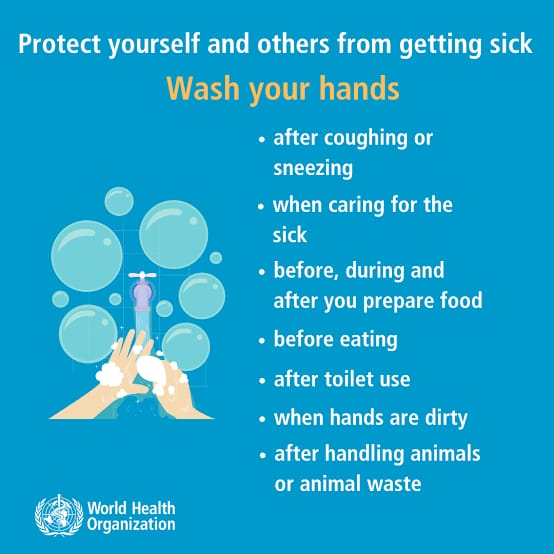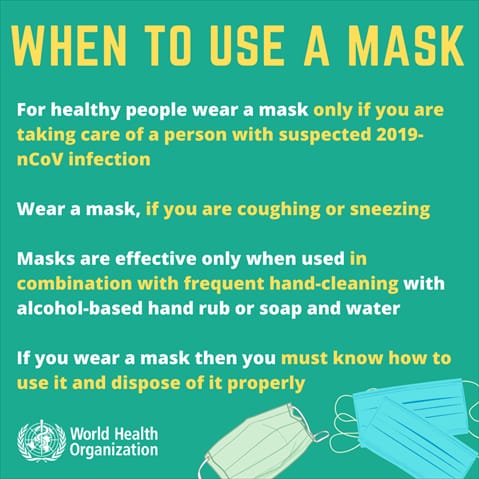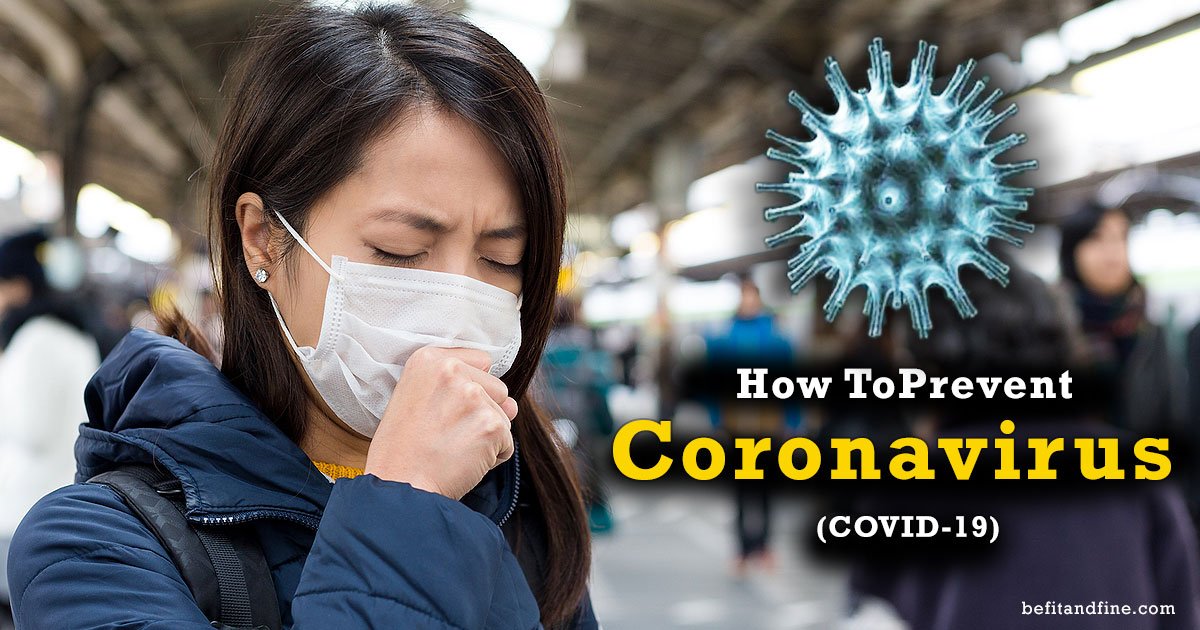The rapid spread of the coronavirus now called COVID-19 has sparked alarm worldwide. A novel coronavirus that first appeared in Wuhan, China, in December continues to sicken tens of thousands of people around the world. In the weeks since the outbreak, the disease has been named COVID-19 by the World Health Organization (WHO). WHO has declared a global health emergency, and many countries are grappling with a rise in confirmed cases. Most people who become infected experience mild illness and recover, but it can be more severe for others. Take care of your health and protect others by spreading caution and not panic. Remember Coronavirus PREVENTION IS BETTER THAN CURE!
ALSO READ: Treat Dry Cough With Natural Ayurvedic Home Remedies
What Is Coronavirus (COVID-19)
Coronaviruses (CoV) are a large family of viruses. COVID-19 is an illness, caused by a member of the coronavirus family. A novel coronavirus (nCoV) is a new strain that has never been encountered before. Like other coronaviruses, it has come from animals. Many of those initially infected either worked or frequently shopped in the Huanan seafood wholesale market in the centre of the Chinese city.
Coronaviruses are zoonotic, meaning they are transmitted between animals and people.
Experts across the world have advised to reduce mass gatherings to avoid the spread of COVID-19 Novel Coronavirus. Hence, this year I have decided not to participate in any Holi Milan programme.
— Narendra Modi (@narendramodi) March 4, 2020
ALSO READ: Weight Reducing Yoga- 5 Breathing Exercises For Weight Loss
Incubation Period For The Coronavirus
An incubation period is a time between catching an illness and showing symptoms of the illness. Current estimates suggest that symptoms of COVID-19 usually appear within around five days or less in most cases, but the range could be between one and 14 days.

ALSO READ: Best Flu-Fighting Foods To Boost Immunity
Symptoms Of Coronavirus
Those who have the virus may have no obvious symptoms (be asymptomatic) or symptoms ranging from mild to severe. In some cases, the virus is life-threatening or fatal. It causes illness ranging from the common cold to more severe diseases such as Middle East Respiratory Syndrome (MERS-CoV) and Severe Acute Respiratory Syndrome (SARS-CoV).
Symptoms may appear 2-14 days after exposure. Common signs of infection include-
- Fever
- Cough
- Runny nose
- Tightness in the chest.
- Shortness of breath and breathing difficulties.
- In more severe cases, the infection can cause pneumonia, severe acute respiratory syndrome, kidney failure and even death.
As this is viral pneumonia, antibiotics are of no use. The antiviral drugs we have against the flu will not work. Recovery depends on the strength of the immune system. Many of those who have died were already in poor health.
ALSO READ: Bollywood Surrogacy Trend- Celebrities Who Opted For Surrogate Kids
Mode Of Transmission
Human Coronavirus (COVID-19) most commonly spread from an infected person to other through-
- Respiratory droplets produced when an infected person coughs or sneezes. (These droplets can land in the mouths or noses of people who are nearby or possibly be inhaled into the lungs.)
- Close personal contact, such as touching or shaking hands.
- Touching an object or surface with the virus on it, then touching your mouth, nose, or eyes before washing your hands.
ALSO READ: Hot Winter Drinks To Keep You Warm In This Cold Weather
CORONAVIRUS Prevention- Tips To Reduce The Risk
There is currently no vaccine to prevent coronavirus disease 2019 (COVID-19). The best way to prevent illness is to avoid being exposed to this virus. However, everyday preventive actions are highly recommended to help reduce the risk of COVID-19 infection.
- Wash your hands often with soap and water for at least 20 seconds, especially after going to the bathroom; before eating; after toilet use; and after blowing your nose, coughing, or sneezing.
If soap and water are not readily available, thoroughly clean your hands using an alcohol-based hand sanitizer with at least 60% alcohol. - Maintain at least 1 metre (3 feet) distance between yourself and anyone who is coughing or sneezing.
- Hands touch many surfaces and can pick up viruses. Once contaminated, hands can transfer the virus to your eyes, nose or mouth. From there, the virus can enter your body and can make you sick. So, avoid touching your eyes, nose, and mouth.
- Clean and disinfect frequently touched objects and surfaces using a regular household cleaning spray or wipe.
- Droplets spread the virus. When you cough or sneeze, cover your mouth and nose with your bent elbow or tissue. Then throw the tissue in the trash.
- Avoid crowded places.
- Avoid hugging, kissing, and shaking hands while greeting.
- Drink plenty of water, liquids and eat nutritious & immune booster foods.
- Before eating, cook meat and egg thoroughly.
- Stay home if you feel unwell. If you have a fever, cough and difficulty breathing, seek medical attention and call your local health authority in advance. This will allow your health care provider to quickly direct you to the right health facility and also help prevent the spread of viruses and other infections.
- You don’t need to wear a mask if you are well. Face masks should be used by people who show symptoms of COVID-19 to help prevent the spread of the disease to others. The use of facemasks is also crucial for health workers and people who are taking care of someone in close settings (at home or in a health care facility).
- Stay aware of the latest information on the COVID-19 outbreak. Follow the advice given by your healthcare provider, your national and local public health authority.

ALSO READ: 10 Most Anti Inflammatory Foods To Fight Inflammation Naturally
Treatment Of Coronavirus
There is no specific antiviral treatment recommended for COVID-19. People who think they may have been exposed to COVID-19 should contact their healthcare provider immediately and follow these directions-
- People with COVID-19 should receive supportive care to help relieve symptoms. For severe cases, treatment should include care to support vital organ functions.
- Isolate yourself at home during the illness. Restrict activities outside your home, except for getting medical care. Do not go to work, school, or public areas. Avoid using public transportation, ride-sharing, or taxis
- Stay in a specific room and away from other people and animals in your home. Also, you should use a separate bathroom, if available.
- Wear a facemask when you are around other people (e.g., sharing a room or vehicle) or pets and before you enter a healthcare provider’s office.
- Avoid sharing personal household items like dishes, drinking glasses, cups, eating utensils, towels, or bedding with other people or pets in your home. After using these items, they should be washed thoroughly with soap and water.
- Practising good hygiene is critical in preventing the spread of the new coronavirus.
Spread Caution, Not Panic!
